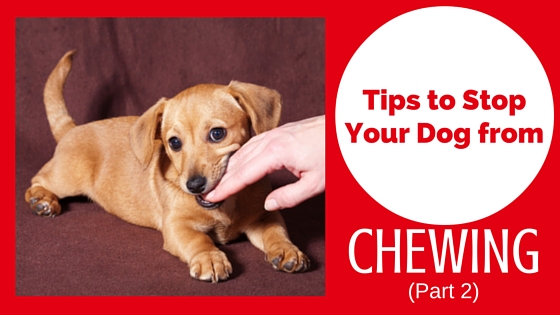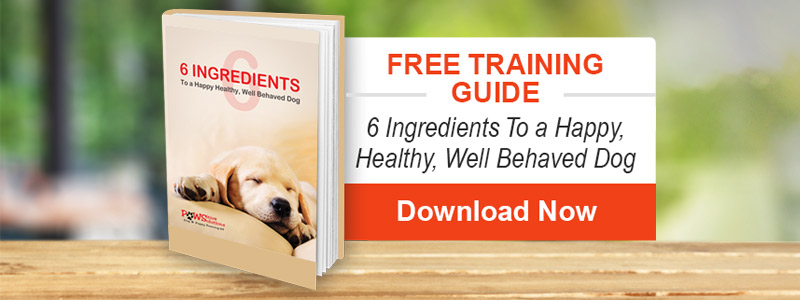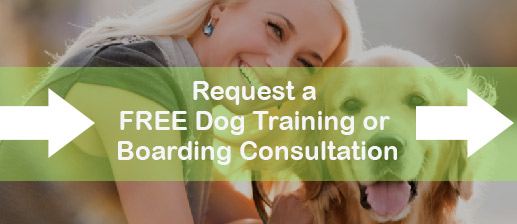Tips to Stop Your Dog From Chewing Things! (Part 2)
May 10th, 2018 by Marlene Ring
As I said in Part 1, a question I am often asked by my clients is “How do I stop my dog from chewing on things?” It is a problem lots of dogs have, but again you have to realize that Chewing is a normal behavior for them.
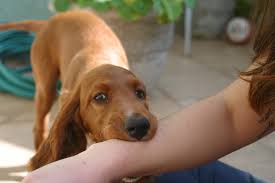 I talked about ‘why’ dogs chew and how to keep them from chewing on small and even big objects in Part 1.
I talked about ‘why’ dogs chew and how to keep them from chewing on small and even big objects in Part 1.
Now I would like to address when your dog bites or chews on humans.
Chewing on humans
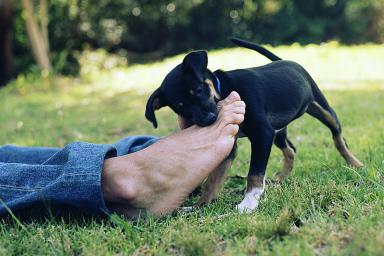 Chewing on humans? That sounds odd. It is what we call nipping and there are many reasons dogs nip at humans.
Chewing on humans? That sounds odd. It is what we call nipping and there are many reasons dogs nip at humans.
A lot of our dogs nip as a way to interact with us like they would with other dogs. Some dogs have also realized that nipping on you will get your undivided attention.
Then you have the ones who utilize nipping as a way to control your movements, either herding or it could be a signal to tell you that what you are doing is not ok with them.
Perhaps they want you to stop petting them in a certain spot. We tend to forget that a nip can also be a way for them to communicate with you.
This last one is very important to consider. Is my dog nipping because something hurts? Maybe you trimmed a nail too short or there is a certain painful spot in their bodies. Is your dog teething and therefore finds it hard to have someone touch his face?
So what do you do?
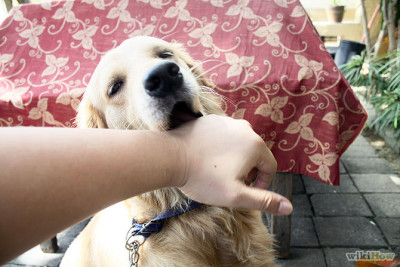 1) This first technique may be very useful, but sometimes is not successful at all. You will know the very first time you try it. When the dog grabs a hold of your hand or any other body part, let out a loud screech, “ouch!”
1) This first technique may be very useful, but sometimes is not successful at all. You will know the very first time you try it. When the dog grabs a hold of your hand or any other body part, let out a loud screech, “ouch!”
If the dog backs up immediately and looks worried, then this will probably work very well for this dog.
However, if after saying “ouch!” the dog backs up and then pounces ready for play, it’s not going to help. Don’t try this again and just move on to one of these other suggestions.
2) Try exchanging your arm for an appropriate thing to chew on. Continue to hold on to the toy so it’s interesting for a bit longer. We often just try an exchange but if the dog is looking for interaction he will soon be bored with the object and go right back to nipping.
3) Some breeds like Border Collies or Australian Shepherds have natural instincts to direct movements of those around them. For dogs that are ‘herding’ you, sometimes just ‘stopping’ can teach them that they won’t be able to control your movement.
4) When nipping just won’t stop using the above methods then it is time for a time out.
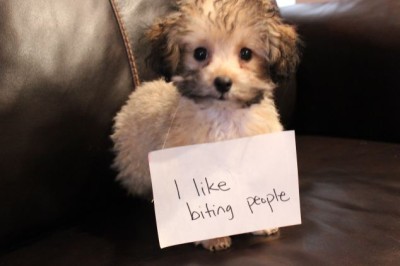 Time Out is just a place where your dog is by himself and safe. It can be a small bathroom or their crate. Somewhere where they can’t get into more trouble, but are away from you or whoever they were nipping on.
Time Out is just a place where your dog is by himself and safe. It can be a small bathroom or their crate. Somewhere where they can’t get into more trouble, but are away from you or whoever they were nipping on.
The dog is not being punished. We are merely giving them a chance to settle down.
Try putting him away for about 5 minutes. At the end of those 5 minutes, let the dog back out and give them a chance to hang with you.
If they go back to the same behavior, then send them back in for 10 minutes and then 15 if necessary. If after 15 minutes of time out your dog is still trying to chew on you then this dog has too much pent up energy and they need to ‘move’ to get it out.
At this point you will put a leash on the dog and go for a very brisk walk. No sniffing around the block or chatting with the neighbor kind of stroll, but a short leash, moving fast to get all the energy out kind of walk.
This works best if you can plan future walks before they are all excited and nipping like crazy. Most of us already know when that time is. I call it “the zoomies”.
It usually happens every night at around the same time. It is as if the dog needs to get rid of the last bit of energy before they can settle for the night.
If you know that time is usually 6 pm, then at a convenient time before then, you should be ready to help your dog spend that energy in a ‘positive way’ BEFORE he starts nipping at your feet and you end up getting mad at him.
Keep in mind that all dogs are different and that we are trying to help them through what may be a difficult time, probably adolescence.
What about Puppies? How do I stop my puppy from biting me?
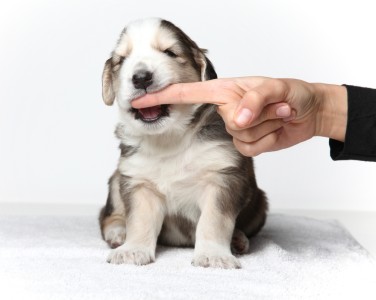 Even more than adult dogs, biting is a natural puppy behavior. Just like human babies, puppies explore their world with their mouths, and they use their teeth extensively in play.
Even more than adult dogs, biting is a natural puppy behavior. Just like human babies, puppies explore their world with their mouths, and they use their teeth extensively in play.
Learning bite inhibition is an important part of a young puppy’s education. If he bites his mom or his littermates too hard, they let him know.
Mom may reprimand him roundly if his needle sharp puppy teeth close too hard during nursing, and his siblings may yipe and refuse to play with him if he bites too hard.
One of the pitfalls of taking a puppy away from his littermates too soon is that he misses out on this important lesson. Pups should stay together with their litters and their moms until they are at least eight weeks of age.
Even so, our pups comes to us with sharp baby-teeth, and we need to continue his bite-inhibition lessons.
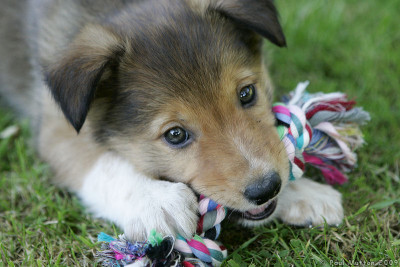 Start by directing his chewing instincts toward appropriate chew toys (a stuffed Kong is ideal for this) as are various soft plush and rope toys. You can also imitate his littermates by giving a sharp, high-pitched “yipe” when he bites too hard, and stopping the play session by getting up and walking away.
Start by directing his chewing instincts toward appropriate chew toys (a stuffed Kong is ideal for this) as are various soft plush and rope toys. You can also imitate his littermates by giving a sharp, high-pitched “yipe” when he bites too hard, and stopping the play session by getting up and walking away.
Your pup will soon learn that his behavior makes a good thing go away (this is called “negative punishment,” and involves no physical correction whatsoever). He will learn to soften his bite so you will keep playing with him.
After a brief time out of a minute or two, you can go back to playing. If he bites too hard again, give another “yipe” and do another time out. He’ll get it eventually.
Do not use physical force or punishment, such as hitting him, holding his muzzle closed or forcing your finger down his throat. Some puppies will become aggressive when you do this, and others will learn to fear your hands. Neither of these is a good outcome.
Remember, Chewing is normal for your dog. Whether he is exploring his new world, anxious or just bored, you can guide him to the behavior you desire. Try these tips, but keep in mind that all dogs are different. If these techniques are not working for you then please give me a call to get a personalized analysis of your situation.
